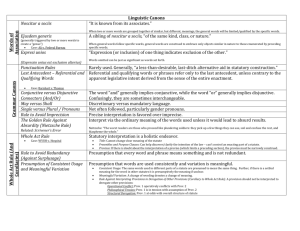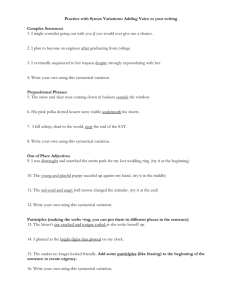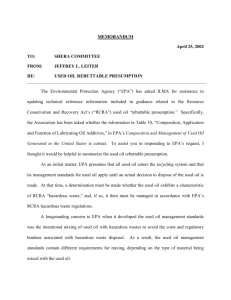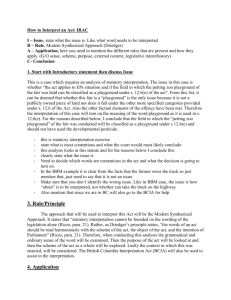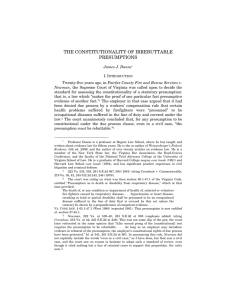Syntactical Presumptions
advertisement
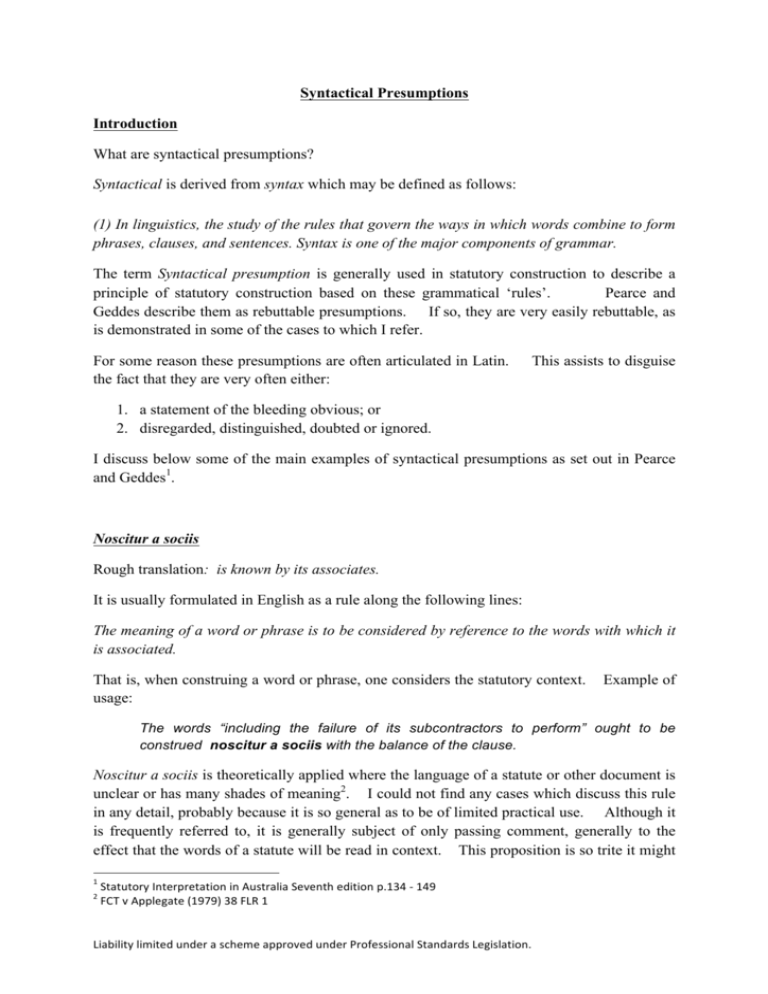
Syntactical Presumptions Introduction What are syntactical presumptions? Syntactical is derived from syntax which may be defined as follows: (1) In linguistics, the study of the rules that govern the ways in which words combine to form phrases, clauses, and sentences. Syntax is one of the major components of grammar. The term Syntactical presumption is generally used in statutory construction to describe a principle of statutory construction based on these grammatical ‘rules’. Pearce and Geddes describe them as rebuttable presumptions. If so, they are very easily rebuttable, as is demonstrated in some of the cases to which I refer. For some reason these presumptions are often articulated in Latin. the fact that they are very often either: This assists to disguise 1. a statement of the bleeding obvious; or 2. disregarded, distinguished, doubted or ignored. I discuss below some of the main examples of syntactical presumptions as set out in Pearce and Geddes1. Noscitur a sociis Rough translation: is known by its associates. It is usually formulated in English as a rule along the following lines: The meaning of a word or phrase is to be considered by reference to the words with which it is associated. That is, when construing a word or phrase, one considers the statutory context. usage: Example of The words “including the failure of its subcontractors to perform” ought to be construed noscitur a sociis with the balance of the clause. Noscitur a sociis is theoretically applied where the language of a statute or other document is unclear or has many shades of meaning2. I could not find any cases which discuss this rule in any detail, probably because it is so general as to be of limited practical use. Although it is frequently referred to, it is generally subject of only passing comment, generally to the effect that the words of a statute will be read in context. This proposition is so trite it might 1 2 Statutory Interpretation in Australia Seventh edition p.134 -­‐ 149 FCT v Applegate (1979) 38 FLR 1 Liability limited under a scheme approved under Professional Standards Legislation. not really need a Latin maxim. However being a grammatical presumption it seems to focus on the immediate statutory context rather than the context of the statute as a whole. Noscitur a sociis is sometimes cited in combination with other syntactical presumptions. Other presumptions discussed below are commonly characterised as sub-rules of the general principle Noscitur a sociis. Confusingly, however, the presumptions below are also sometimes referred to as substitutes for, or equivalents of, Noscitur a sociis. Ejusdem generis Rough translation ‘of the same kind’. It is a presumption which leads to the reading down of general words by reference to specific words elsewhere in the legislation. Most commonly, where a statute lists specific classes of persons or things and then refers to a general category which includes those things in the list, the general words may be restricted by reference to the specific words used. The general words are taken to be limited to things of the same sort as those specified. A simple illustration would be the construction of the then s123A(1) of the Income Tax Assessment Act. The phrase ‘a railway, road, pipeline or other facility’ was read ejusdem generis so that the words ‘other facility’ were taken to refer only to facilities on or through which goods might be moved or conveyed and to exclude a general storage facility3. Pearce and Geddes provide a number of other examples of this type. However it is not necessary that the description includes the word ‘other’. An indication that the general words are to be read as a continuation of the preceding specific words may be sufficient. The presumption creates a number of questions. What (if anything) is the ‘genus’ or general category of like matters which is being described? Is it intended to limit the general words that follow? Does the person or thing in question fit within the scope of that category or not? If no genus or general category is established, the rule cannot apply. A single word followed by a general expression, such as a stone or other missile, could not generally give rise to a genus4. The fewer the specific items listed, the less likely a genus will be found. Even where a substantial list precedes the general words, the identification of the existence and characteristics of a genus can be problematic. As Ashley J said in Mayne Nickless v 5 Federal Commissioner of Taxation : 3 Canwan Coals Pty Ltd v FCT [1974] 1 NSWLR 728 Field b Gent (1996) 67 SASR 122 5 (1991) 22 ATR 198 at 211 4 Liability limited under a scheme approved under Professional Standards Legislation. There has been a judicial reluctance to apply the ejusdem generis principle...and it is apparent that, if a genus is to be identified, the string of words must ‘possess some common and dominant feature’..... The presumption will only be attracted if there is no contrary intent is demonstrated, and (possibly) if a literal reading of the general words will lead to absurdity. Mahoney J said of ejusdem generis6: The ...process of reasoning has had a long but varied history; is based on a doubtful premise; operates by a mechanism which is uncertain; and, to the extent that it presently operates, in my opinion, has real effect to determine the construction of a statute only in a limited area. Mahoney J in the same judgment cited Dr Glanville Williams to the effect that: the maxim has ‘caused a great deal of litigation and seems frequently to have thwarted the intentions of the draftsmen of statutes, deeds, wills, contracts and memorandums of association. If there is any indication that the words are to be read in the general sense in which they are expressed, the rule will not apply. As Spigelman J said in Deputy Commissioner of 7 Taxation v Clark : “The process of reading down general words in a statute is a frequently recurring issue in statutory interpretation .....Application of the ejusdem generis rule is a specific example of this process. The application of this rule, in substance, gives the immediate verbal context determinative weight in the process of construing general words. In my opinion, this is rarely justified. Whether or not general words ought be read down is to be determined by the whole of the relevant context, including other provisions of the statute and the scope and purpose of the statute” (emphasis added) Expressio Unius est exclusio alterius The rough translation: the expression of one is the exclusion of others. Generally formulated along the following lines: When one or more things of a class are expressly mentioned in a statute others of the same class are excluded. 6 Mattinson v Multiplo Incubators [1977] 1 NSWLR 368 at 374 7 [2003] NSWCA 91; 57 NSWLR 113 at [127] Liability limited under a scheme approved under Professional Standards Legislation. Again the more closely one looks at this seemingly simple proposition, the more difficult it becomes to determine when and how it is attracted. Consideration has to be given, for example, to whether the different things are really of the same class. Consideration has to be given also to whether there is merely overlap in the statute. There seem to be relatively few cases where the principle has actually been applied. One example cited by Pearce and Geddes is Salemi v MacKellar (No 2) 8 where it was found that the Migration Act 1958 had deliberately laid down differing procedures for the deportation of prohibited immigrants and for ‘aliens’, because the procedures for both were set down and were different. ‘Aliens’ accordingly had significantly less rights under the Act, and additional rights which might otherwise have applied were thereby excluded. Another example is that where certain higher duties allowances formed part of a person’s salary for superannuation purposes, other like allowances which were not specified were excluded9. It might be thought that these conclusions could have safely been reached without resort to Expressio Unius est exclusion alterius. In Salemi, if any syntactical presumption were required, Expressum Facit Cessare Tacitum (see below) would seem more appropriate. Other cases referred to by Pearce and Geddes where the presumption has been applied include Bass v Permanent Trustee Ltd10 and O’Connell v Nixon11. There are, on the other hand, numerous High Court cases where the presumption has been rejected as unhelpful or inapplicable. See for example Hussein v Under Secretary of Industrial Relations and Technology (NSW) [1982] HCA 2; (1982) 148 CLR 88 at 94; Ainsworth v Criminal Justice Commission [1992] HCA 10; (1992) 175 CLR 564 at 575 per Mason CJ, Dawson, Toohey and Gaudron JJ; Wentworth v NSW Bar Association [1992] HCA 24; (1992) 176 CLR 239 at 250 per Deane, Dawson, Toohey and Gaudron JJ; PMT Partners Pty Ltd (In Liq) v Australian National Parks and Wildlife Service [1995] HCA 36; (1995) 184 CLR 301 at 311 per Brennan CJ, Gaudron and McHugh JJ, 320 per Toohey and Gummow JJ; Federal Commissioner of Taxation v Rowe [1997] HCA 16; [1997] HCA 16; (1997) 187 CLR 266 at 277 per Brennan CJ, Dawson, Toohey and McHugh JJ. As Pearce and Geddes note, this presumption is applied with “extreme caution”. Its application is a matter of impression, based upon the precision of drafting and the similarity in the subject matter of the provisions considered. It will also be relevant to consider whether the Act in which the provisions occur has been amended extensively, as this will increase the risk of unintentional inconsistency or overlap. It is more often used to bolster a conclusion than as a basis to reach a conclusion12. It will not be used where it brings about 8 (1977) 137 CLR 396 Eastman v Cmmr for Superannuation (1987) 74 ALR 221 10 (1999) 198 CLR 334 at 348-­‐9 11 (2007) 16 VR 440 at 448 12 See for example Carr v Finance Corp of Australia (1982) 150 CLR 139 at 150 9 Liability limited under a scheme approved under Professional Standards Legislation. a result which the legislature is unlikely to have intended13. useful servant which must not become a master14. Kirby P described it as a In Barratt v Howard15 Hely J stated at 615: “The Solicitor-General's submission invokes the maxim: expressio unius est exclusio alterius . The High Court has repeatedly warned that this principle is to be applied with caution: Re Wakim; Ex parte McNally at 79; Federal Commissioner of Taxation v Rowe at 277; Ousley v R at 525 and 539; Ainsworth v Criminal Justice Commission at 575; Houssein v Under Secretary of Industrial Relations & Technology (NSW) t 94; Wentworth v NSW Bar Association at 250; PMT Partners Pty Ltd (in liq) v Australian National Parks & Wildlife Service at 311. It applies only when the intention it expresses is discoverable upon the face of the instrument: Houssein v Under Secretary of Industrial Relations & Technology (NSW) at 94; Ousley v R at 525. “Reliance on the maximum expressio unius personae vel rei, est exclusio alterius can seldom, if ever, be enough to exclude the common law rules of natural justice”: Baba v Parole Board of NSW at 349C.” (emphasis added; citations omitted) The presumption has recently been considered in the context of the scope of the adverse action provisions of the Fair Work Act 2009. The Full Court (majority) in Barclay v The Board of Bendigo Regional Institute of Technical and Further Education16 held that the specific protections against adverse action on grounds of particular industrial activities in s346(b) and (c) did not narrow or limit the more general protections in s346(a) on adverse action because of membership of an industrial association etc. Given the history and purpose of the provisions the Court held that the presumption had no application and the result was simply that there was very substantial overlap between the provisions. Expressum Facit Cessare Tacitum Translates very roughly as “what is expressed makes what is implied silent.” It is very similar in meaning to Expressio Unius est exclusion alterius. It is interpreted as meaning that where a law prescribes a particular way of doing something, it is implied that such is the only way that something can be done. Positive words specifying the way in which something may be done may have the negative effect of preventing that thing being done any other way. 13 Ainsworth v CJC (1992) 66 ALHR 271 at 273 Hornsby Shire Council v Porter (1990) 19 NSWLR 716 at 720 15 (1999) 165 ALR 605 14 16 [2011] FCAFC 14 (9 February 2011) Liability limited under a scheme approved under Professional Standards Legislation. The principle is described in Anthony Horden and Sons v Amalgamated Clothing and Allied Trades Union17 as follows: "where the legislature explicitly gives a power by a particular provision which prescribes the mode in which it shall be exercised and the conditions and restrictions which must be observed, it excludes the operation of general expressions in the same instrument which might otherwise have been relied upon for the same power". Similar questions to those discussed above arise as to whether there is real inconsistency or overlap, and whether the specific provision is intended to limit the operation of the general. The fact that two separate sources of power might be exercised in respect of the same subject matter and with similar effect does not necessarily attract the presumption. In Minister for Immigration v Nystrom18 the High Court discussed various authorities dealing with the presumption. Gummow and Hayne JJ said: Anthony Hordern and the subsequent authorities have employed different terms to identify the relevant general principle of construction. These have included whether the two powers are the "same power"[54], or are with respect to the same subjectmatter[55], or whether the general power encroaches upon the subject-matter exhaustively governed by the special power[56]. However, what the cases reveal is that it must be possible to say that the statute in question confers only one power to take the relevant action, necessitating the confinement of the generality of another apparently applicable power by reference to the restrictions in the former power. In all the cases considered above, the ambit of the restricted power was ostensibly wholly within the ambit of a power which itself was not expressly subject to restrictions. (emphasis added) The Court in Nystrom found that the supposedly competing provisions did not deal with the same subject matter and accordingly the presumption was not attracted. Interestingly, the Court said in this context19: ...whilst “rules” or principles of construction may offer reassurance, they are no substitute for consideration of the whole of the particular text....its subject, scope and purpose. Because Expressum Facit Cessare Tacitum is more confined than the Expressio Unius principle, it seems, as Pearce and Geddes have noted, that the courts are more comfortable in applying it. A Full Court of the Federal Court has stated that the presumption would not 17 (1932) 47 CLR 1 at 7 18 (2006) 228 CLR 566 at 586 -­‐592 Par. 54 19 Liability limited under a scheme approved under Professional Standards Legislation. generally apply where powers are expressly conferred in separate enactments20. and Geddes doubt the correctness of this conclusion. Pearce Generalia Specialibus Non Derogant Loosely translated as, the general cannot detract from the specific. It is generally interpreted as meaning that specific provisions will prevail over general provisions to the extent of any conflict. The principle has been applied both with respect to the operation of different legislation, and in relation to provisions within the same Act. Pearce and Geddes suggest21 that it will be more strictly applied in the latter case, because the draftperson is more likely in that case to have been aware of any inconsistencies and of the application of the presumption (these observations obviously do not apply to the Fair Work Act 2009). The rule “will only be attracted where there are two inconsistent provisions which cannot be reconciled as a matter of ordinary interpretation”22. An example where the presumption was applied is Commercial Radio Coffs Harbour v Fuller23, where a general provision making non compliance with a provision of the Act an offence had to be read down if another law prohibited the activity that the Act required. The specific will generally not limit the general where special provision is made adding powers to those general powers already in the legislation24. In Bank Officials' Association (South Australian Branch) v Savings Bank of South Australia25 various members of the High Court discussed the principle and earlier authorities. Isaacs and Rich JJ said: "As to the second ground, namely, the maxim Generalia specialibus non derogant, the first requisite is to get a clear understanding of its meaning. In Barker v. Edger (1898) AC @ 754 it is said: 'The general maxim is, Generalia specialibus non derogant. When the Legislature has given its attention to a separate subject, and made provision for it, the presumption is that a subsequent general enactment is not intended to interfere with the special provision unless it manifests that intention very clearly. More recently in Smith v The Queen26 the Court said: 20 RE WIlc ox Ex parte Venture Industries Pty Lrtd (1996) 66 FCR 511 at 530 -­‐ 1 Pearce and Geddes pa. 4.38 22 Pearce and Geddes par. 4.38 and authorities referred to therein including Reseck v FCT (1975) 133 CLR 45 at 43 23 (1986) 161 CLR 47 24 Pearce and Geddes par. 4.38; ASIC v AAT (2009) 263 ALR 411 at 430 25 (1923) 32 CLR 276 21 Liability limited under a scheme approved under Professional Standards Legislation. 21. In our view, an opposite conclusion is dictated by the principle that where there is a conflict between general and specific provisions, the specific provision prevails ( generalia specialibus non derogant ). That principle is based upon the presumed intention of Parliament and has, we think, a particular application where the conflict arises from different sections in the same Act ((21) See Perpetual Executors and Trustees Association of Australia Ltd. v. Federal Commissioner of Taxation [1948] HCA 24; (1948) 77 CLR 1 at 29.). But even if, because s.132 merely amends the Constitution Act 1975, the conflict is regarded as arising between two separate Acts, the principle is just as applicable and there is no reason why regard may not be had to the common origin of the conflict, namely, the Supreme Court Act 1986. In Construction, Forestry, Mining and Energy Union v Hadgkiss27 a Full Court of the Federal Court discussed the earlier authorities as follows: 77 In Thomson Australian Holdings Pty Ltd v Trade Practices Commission [1981] HCA 48; 148 CLR 150, the High Court referred to the maxim generalia specialibus non derogant ; that is, where there is a conflict between general and specific provisions the specific provisions prevail. Such a principle "is not a technical rule peculiar to English statutory interpretation. Rather it represents simple commonsense and ordinary usage": Effort Shipping Company Ltd v Linden Management SA (the Giannis NK) [1998] UKHL 1; [1998] 1 All ER 495 at 513 per Lord Cooke; Hoffman v Chief of Army [2004] FCAFC 148; (2004) 137 FCR 520 at 571. (Emphasis added) It seems that the presumption will be applied when it accords with common sense and not otherwise. There is obviously a substantial overlap with the Expressio Unius est exclusion alterius presumption and in many cases the two can be used interchangeably. Finite Incantatum This lesser known maxim is roughly translated as end to the incantation. It deals with the presumption that the words of the statute will actually make sense without reference to ancient Latin maxims. It is rarely used for obvious reasons28. 26 (1994) 69 ALJR 24 at 27 27 [2009] FCAFC 17 Liability limited under a scheme approved under Professional Standards Legislation. Conclusion The first difficulty when seeking to rely upon a syntactical presumption such as those discussed above is showing that they apply at all in any given statutory context. The second is to show that they are not in any event overridden by general principles of statutory construction. The usual course when confronted with an opponent (or judicial officer) who relies upon these syntactical presumptions against you, is to flop out your well thumbed copy of Project Blue Sky v Australian Broadcasting Authority29. Usually one might make straight for paragraphs 69 – 71, but in this context it could be useful to refer to paragraph 78: ....Ordinarily, that meaning (the legal meaning) will correspond with the grammatical meaning of the provision. But not always. The context of the words, the consequences of a literal or grammatical construction, the purpose of the statute or the canons of construction[56] may require the words of a legislative provision to be read in a way that does not correspond with the literal or grammatical meaning. In Statutory Interpretation, Mr Francis Bennion points out[57]: "The distinction between literal and legal meaning lies at the heart of the problem of statutory interpretation. An enactment consists of a verbal formula. Unless defectively worded, this has a grammatical meaning in itself. The unwary reader of this formula (particularly if not a lawyer) may mistakenly conclude that the grammatical meaning is all that is of concern. If that were right, there would be little need for books on statutory interpretation. Indeed, so far as concerns law embodied in statute, there would scarcely be a need for law books of any kind. Unhappily this state of being able to rely on grammatical meaning does not prevail in the realm of statute law; nor is it likely to. In some cases the grammatical meaning, when applied to the facts of the instant case, is ambiguous. Furthermore there needs to be brought to the grammatical meaning of an enactment due consideration of the relevant matters drawn from the context (using that term in its widest sense). Consideration of the enactment in its context may raise factors that pull in different ways. For example the desirability of applying the clear literal meaning may conflict with the fact that this does not remedy the mischief that Parliament intended to deal with." (footnotes omitted) (emphasis added) 28 Just kidding, as any Harry Potter fan will know. It is of course a spell to end the effects of other spells. 29 (1998) 194 CLR 355 Liability limited under a scheme approved under Professional Standards Legislation. In other words, it is the very fact that statutes depart from their ordinary grammatical meaning that necessitates learned volumes on statutory construction! Project Blue Sky obviously trumps syntactical presumptions every time. There are, of course, a number of other trump cards one might play, in terms of other canons of statutory construction. Project Blue Sky the ace, if only for its majestically broad and sweeping approach. The precise scope of Project Blue Sky will no doubt be explained in pellucid detail by someone else at a later date. I look forward to that. However one further, much loved, quote seems appropriate. In Lewis Carroll's Through the Looking-Glass (1872), Humpty Dumpty discusses semantics with Alice. Judges love to quote part of the discussion as a way of ridiculing legislators, although in my view Humpty Dumpty could himself easily be a judge. The quote does seem particularly relevant to the matters discussed above. I include an extended passage so that the oft quoted words can be construed in their full and glorious context. I don’t know what you mean by ‘glory,’ ” Alice said. Humpty Dumpty smiled contemptuously. “Of course you don’t — till I tell you. I meant ‘there’s a nice knock-down argument for you!’ ” “But ‘glory’ doesn’t mean ‘a nice knock-down argument’,” Alice objected. “When I use a word,” Humpty Dumpty said, in rather a scornful tone, “it means just what I choose it to mean—neither more nor less.” “The question is,” said Alice, “whether you can make words mean so many different things.” “The question is,” said Humpty Dumpty, “which is to be master that’s all.” Alice was too much puzzled to say anything, so after a minute Humpty Dumpty began again. “They’ve a temper, some of them—particularly verbs, they’re the proudest—adjectives you can do anything with, but not verbs—however, I can manage the whole lot! Impenetrability! That’s what I say! Would you tell me, please,' said Alice `what that means? `Now you talk like a reasonable child,' said Humpty Dumpty, looking very much pleased. `I meant by "impenetrability" that we've had enough of that subject, and it would be just as well if you'd mention what you mean to do next, as I suppose you don't mean to stop here all the rest of your life.' Liability limited under a scheme approved under Professional Standards Legislation. ‘That's a great deal to make one word mean,' Alice said in a thoughtful tone. `When I make a word do a lot of work like that,' said Humpty Dumpty, `I always pay it extra.' THE END Liability limited under a scheme approved under Professional Standards Legislation.
